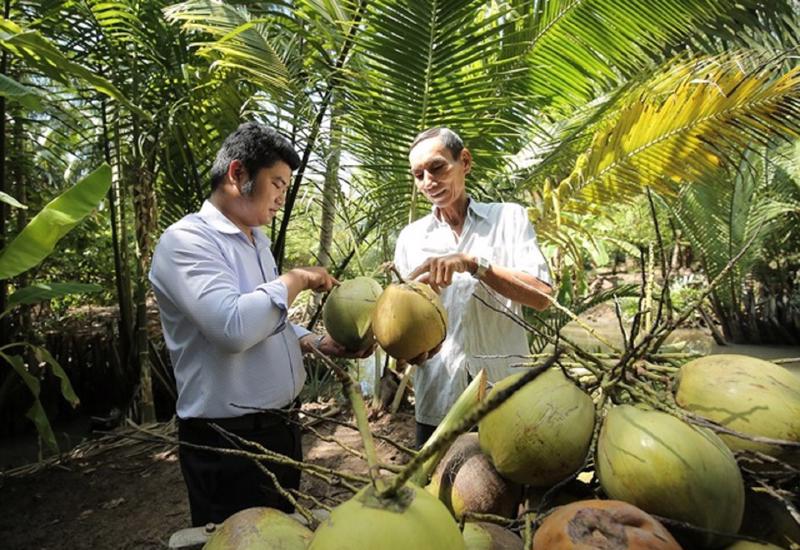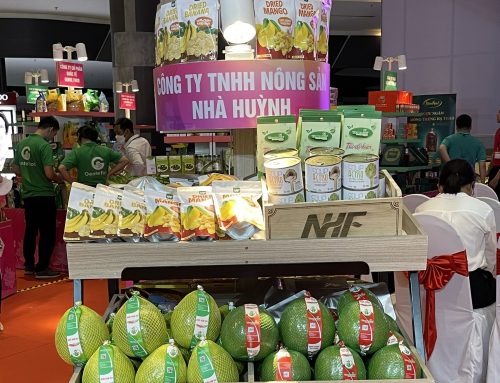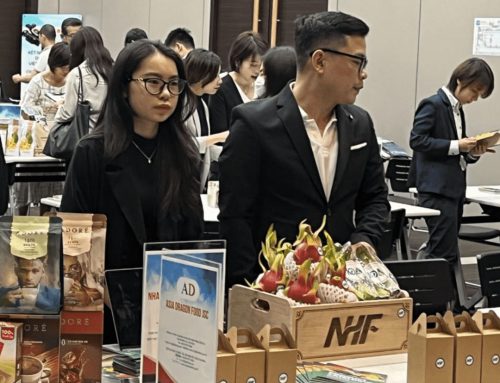The US Department of Plant Quarantine (APHIS) has just announced that the US has opened the market for Vietnamese coconuts (coconuts with peeled and fibrous layers). Vietnamese manufacturers can start exporting “immediately”…

The Plant Protection Department (Ministry of Agriculture and Rural Development) said that it has just received a letter from APHIS informing that on August 7, 2023, APHIS has completed updating the online database “Requests”. agricultural goods import (ACIR)” to approve the import of young Vietnamese coconuts, having separated at least 75% (3/4) of the coir and completely removed the outer green skin.
VIETNAMESE COCONUT MEETS US REQUIREMENTS
“Vietnamese producers can begin exporting coconuts to the US immediately. Since APHIS has classified partially shelled coconuts as processed products, the only phytosanitary requirements for shipments will only take place at US ports of entry,” the APHIS letter affirmed, adding that it had notified US Customs and Border Protection of the updated content to avoid any disruptions. delays in shipments at ports of entry in the United States.
APHIS has also conducted parallel planning for the next steps in the market access process and internal analysis to evaluate this product. Evaluation results show that Vietnamese coconut shells meet the US requirements for processed products and have a negligible risk of spreading plant pests.
“Besides the US, the Ministry of Agriculture and Rural Development has been actively directing relevant units to export coconut products officially to China.”
Mr. Huynh Tan Dat, Director of the Plant Protection Department.
This means that instead of having to go through the lengthy new market access regulatory process for fresh fruit and vegetables, APHIS can take advantage of existing regulations for processed products to regulate coconut skull shipments. This has significantly accelerated the process for APHIS to approve coconut imports from Vietnam.
Previously, in April 2023, during a meeting with US Secretary of Agriculture Thomas Vilsack, Minister of Agriculture and Rural Development Le Minh Hoan said that the procedures had been completed and the market opened for pomelo from America entered Vietnam. At the same time, the United States is requested to speed up the process of evaluating and opening the door for Vietnam’s coconuts and passion fruits.
In February 2023, the US side sent the results of pest risk analysis for Vietnamese fresh coconuts. Accordingly, 43 species of pests on coconut trees were identified, but none were able to follow fresh young coconuts exported from Vietnam to the US.
The US has required Vietnam to handle fresh young coconuts after harvest such as removing rotten, fallen fruits, removing all the green skin and at least 75% of the coir.
The Plant Protection Department has contacted and coordinated closely with the US Animal and Plant Quarantine Department to select appropriate plant quarantine measures to minimize pest risks. At the same time, in February 2023, the Vietnam Plant Protection Department sent an official dispatch to the Department of Agriculture and Rural Development of coconut-growing provinces and cities, and related production, processing and export enterprises. mandarin.
In the latest letter, APHIS also invited the delegation of the Vietnam Plant Protection Department to participate in the bilateral meeting on plant health in 2023. The US Animal and Plant Quarantine Department expressed the hope that the two sides can come to a conclusion. Final agreement on Vietnam’s import requirements for California (USA) peaches and peach bars in the upcoming negotiation process.
THE “BILLION DOLLARS” FRUIT EXPORT POTENTIAL IS HUGE
Vietnam is among the top 10 largest coconut growing countries in the world, currently has about 200,000 hectares of agricultural land for coconut cultivation, with an output of about 2 million tons, concentrated mainly in the Central Coast provinces and the Mekong River Delta such as: Tra Vinh, Ben Tre.
In 2022, Vietnam’s coconut export turnover will reach 900 million USD, making our country the fourth largest exporter of coconut products in the Asia-Pacific region. If the statistics of other product groups using raw materials from coconut are available, this industry may have entered the export group of “billion dollars”.
“Currently, Vietnamese businesses have developed nearly 90 products processed from coconuts and about 200 types of foods using raw materials from coconut trees. In which, coconut oil products for the medical field are available. highest value”.
Mr. Cao Ba Dang Khoa, Acting General Secretary of the Vietnam Coconut Association.
Mr. Cao Ba Dang Khoa, Acting General Secretary of the Vietnam Coconut Association, said that the country currently has 90 enterprises exporting coconut products, of which 42 enterprises have exported deeply processed products “Made in Vietnam”.
“Currently, the coconut industry is not simply businesses specializing in coconut production, but there are also many businesses exploiting raw materials from coconuts such as food production, essential oil production in the medical field. In particular, coconut tree trunks have great exploitation potential to produce coconut wood products,” Mr. Khoa shared.
In the context of decreasing purchasing power in the world market, from the end of 2022, the price of domestic coconut raw materials will also decrease. This affects the income of coconut growers.
However, coconut fruit in raw material areas that meet organic production standards will still maintain good prices in the first half of 2023. Therefore, one of the key programs of the Vietnam Coconut Association this year is to deploy construction Build sustainable raw material areas so that coconut farmers can enjoy transparent raw material prices, increase the value of coconut fruit and improve the competitiveness of Vietnamese coconut industry businesses in the world market.
According to the Vietnam Coconut Association, the potential for exporting coconut products is still very large. However, the annual saltwater intrusion season in the Mekong Delta is reducing productivity and output, causing a shortage of coconut raw materials for export processing.
Therefore, in addition to the program to build sustainable planting areas, coconut processing and exporting enterprises spend resources on research and development of drought-resistant coconut embryos and fertilizer support policies for farmers. Coconut reduces input costs.
According to Ms. Nguyen Thi Truc Lien, Material Division Director of Ben Tre Import-Export Joint Stock Company (Betrimex), currently, Betrimex has developed more than 8,300 hectares of growing areas in Ben Tre and Tra Vinh that meet organic standards.
To develop the coconut industry in the direction of adding value, Ms. Lien believes that it is necessary to improve the preliminary processing stage. Almost preliminarily processing coconut fruit is done manually, so scientists need to pay attention to research and develop machinery for preliminary processing of coconut fruit, so that businesses can reduce their dependence on manual labor.
Ms. Truc Lien also proposed a preferential capital mechanism for investment projects in coconut processing technology and projects to support farmers in converting to sustainable farming models, according to organic standards of markets. difficult school.
(Chuong Phuong, vneconomy.vn)


